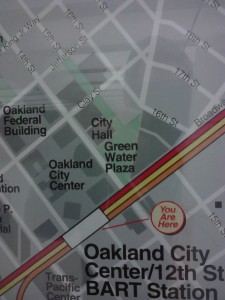
An older BART neighborhood map of downtown Oakland shows City Hall and Frank Ogawa Plaza (then known as Green Water Plaza).
Two of the San Francisco Chronicle’s columnists, Chip Johnson and Debra Saunders, recently called for the city of Oakland to restrict evening protests in light of several recent events devolving into vandalism and other acts. In response, an SF Weekly writer stated the proposals would throw out the Bill of Rights.
I am not a legal expert, but it is theoretically possible to limit evening protests. However, this so-called solution may be difficult to enact and doesn’t seem to address the actual problem of vandalism and similar violence. Don’t get me wrong — there are a lot of problems that people of all walks of life protest, but I’m focusing on this situation for the purposes of discussion.
Regarding limiting protests: Courts have found it can be constitutional for governments to set reasonable date, place and time restrictions on the use of traditional public forums (although any such regulations would need to be content neutral and meet strict scrutiny because it is limiting individuals’ rights).
Regarding strict scrutiny and reasonable date, place and manner restrictions, any proposed regulations have to meet four conditions:
- That there’s a compelling governmental interest.
- That the proposed regulation isn’t too broad.
- That it’s the least restrictive means to achieve that interest.
- And that there are ample alternatives to communicate.
The compelling governmental interest seems to be the easiest condition to meet. An argument can be made about limiting evening protests when similar events demonstrably devolved into violence.
It would be up to the city to clearly specify what the other communication alternatives would be (and whether they would be valid alternatives to those wishing to protest). Ultimately, the second and third conditions may be significantly more difficult to meet and I’m not sure Oakland can meet those.
Restricting evening protests may be overly broad as it restricts many of the hours available for protest and assembly (especially when the sun sets early in the winter). A large segment of the working population is simply unable to participate in protests during the day. Also, many governmental bodies meet in the evening and people have a constitutional right to petition their government.
It could be difficult to prove barring night protests is the least restrictive means because the proposal doesn’t appear to directly address the illegal activity and vandalism that is the heart of this specific matter. Even couched as civil disobedience, breaking windows, destroying cars, and shutting down BART and highways has been and remains illegal. There isn’t much in the proposals to address that. Sure, it may be easier to detect illegal activity if legal protesters went home at a certain time, but it seems to unduly burden those peacefully expressing themselves.
The other factors mentioned by the columnists don’t seem practical for informal protests and assemblies that are formed quickly. I understand the desire for governments to recoup their costs for things such as street patrols and traffic controls and to require that groups stick to a specific route. They all seem reasonable (albeit potentially costly), but it just doesn’t seem workable for more spontaneous protests which would be likely to take place regardless of any potential reasonable regulations.
I don’t think I’m in a position to suggest the best solutions for a city and residents 160 miles away. While possible, imposing new restrictions doesn’t seem to be a move in the right direction.
